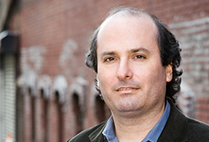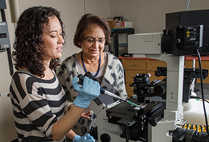As a broadcast journalist in Paris in 1968, Bernard S. Redmont was the first to report that North Vietnamese officials were willing to begin peace negotiations.
A foreign correspondent for 40 years, Redmont also covered Leon Trotsky’s assassination in Mexico, Juan Peron’s dictatorship in Argentina, and the Six-Day War in the Middle East, according to the Washington Post.
A former professor of journalism and dean emeritus of the College of Communication, Redmont died on January 23, 2017. He was 98.
He arrived at COM in early 1982, and was dean from 1983 to 1986. He led the college through curriculum reforms and a name change—from the School of Public Communication (SPC) to the College of Communication—a result of his 1983 long-range study of the school. He also helped pilot the continuing London Internship Programme in 1986.
In response to a 1985 call for proposals from the US government, Redmont proposed a project to train Afghan refugees as professional journalists in the wake of Soviet intervention in Afghanistan. The training ultimately was held in Peshawar, Pakistan, near the Afghan border, in a joint project between the United States Information Agency (USIA) and BU. Redmont had favored an alternate proposal—to train the journalists at COM, in an academic and independent framework—and his disagreements over the project with John Silber (Hon.’95), then the University president, led to his resignation.
Caryl Rivers, a COM professor of journalism, recalls Redmont as “a man who cared deeply for journalism, both in his career and in his time in academia.”
Redmont served in the US Office of the Coordinator of Inter-American Affairs, coordinating broadcasts to Latin America. A World War II veteran and recipient of a Purple Heart, he was a combat correspondent for the marines. After the war, he was the Latin America bureau chief for what would become U.S. News & World Report, and later was transferred to Paris, according to the New York Times.
In the early 1950s, Redmont was subpoenaed by the House Un-American Activities Committee to testify in one of the trials of William Remington, a Commerce Department official accused of being a Communist. After his refusal to name Remington a Communist cost him his job at U.S. News, he remained on the McCarthy-era blacklist for a full decade, and no American news outlet would hire him.
Claude Erbsen, a retired Associated Press vice president and director of world services, describes Redmont as “a man of absolute and unflinching integrity, which cost him dearly in the McCarthy era.”
Redmont worked for Agence France-Press, the Canadian Broadcasting Company, and as Paris bureau chief for Westinghouse Broadcasting Company (Group W). It was there that he broke the story that the North Vietnamese were willing to hold peace talks with the United States. He later received an Overseas Press Club Award for Best Radio Reporting from Abroad. He also worked at CBS News in Moscow and Paris before joining the BU faculty.
He was born Bernard Sidney Rothenberg. He earned an undergraduate degree from the City College of New York and a master’s degree from Columbia University’s school of journalism.













































Related Stories
COM Dean Weighs In on What The Front Runner Got Right—and What It Didn’t
Thomas Fiedler talks about what it’s like to see himself portrayed on the big screen
Taking Stock of the New President’s Foreign Policy Proposals
BU experts predict “a ride like we…have never seen before”
Leader in the Digital Revolution Will Teach It at COM
Martin Nisenholtz was the New York Times digital guru
Post Your Comment